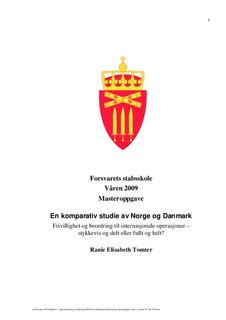En komparativ studie av Norge og Danmark: frivillighet og beordring til internasjonale operasjoner - stykkevis og delt eller fullt og helt?
Master thesis
Permanent lenke
http://hdl.handle.net/11250/99920Utgivelsesdato
2010Metadata
Vis full innførselSamlinger
- Masteroppgaver [466]
Sammendrag
This study deals with the transition to mandatory positing for Danish and Norwegian officers. In both countries, the end of the Cold War meant a stronger international role with deployments in conflict areas far from home. Traditionally, Norwegian and Danish officers had participated in UN peacekeeping operations, although postings in e.g. Congo or the Middle East were occasionally referred to as “vacationing”. These postings were entirely voluntary. In the new, post-89 international climate, demands changed. Now, troops had to be trained and equipped for robust missions. They had to be deployable at short notice. Assembling the required troops on a voluntary basis deprived he politicians and the defence leadership of the required flexibility. As a consequence, mandatory postings were introduced. However, the introduction differed. In Norway, the possibility of mandatory posting was done incrementally. The implementation of the law meant that it was to a large extent up to the individual officer to accept whether mandatory postins should apply. The Danes chose a different strategy practically closing the possibility of avoiding mandatory postings. Moreover, their change was done quickly. In Norway, the opposition between voluntarism versus mandatory postings has pervaded the debate ever since, in Denmark this phase ended quickly. In Norway, the same arguments and positions are endlessly repeated. As a result, other important issues relating to the use of combat troops to further national interests, are out crowded from the political agenda. Moreover, the study highlights the importance of the Danish Defence compromise (Forsvarsforlig) agreed in parliament in providing the defence sector with a five-year stable horizon for planning. In Norway, long-term plans are made, but fail to play the same instrumental role. Instead the Norwegian planning process is hampered by the fact that parliament annually debates and changes the defence budget. Finally, the study highlights the importance of clarity at the starting point in the legal process. In Denmark, the government had a clear vision of how Danish troops should be used to enhance the country’s international standing. In Norway, the geopolitical changes were less acutely felt. As a neighbour to Russia, it was important to retain the engrained ideal of homeland defender while at the same time introduce international postings as an important aspect of an officer’s career.
